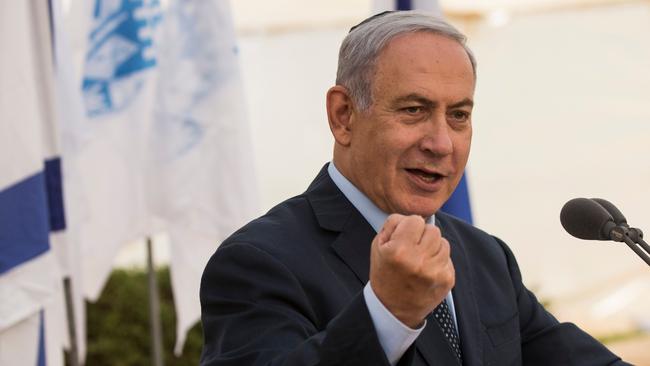Netanyahu urges Europe to quit Iran deal
Israel urges Europe to tear up the nuclear deal with Iran.

Israel raised the pressure on European partners yesterday to tear up the nuclear deal with Iran by sharing secret files showing Tehran’s determination to build a bomb.
One of the key documents is a memorandum that formally hands responsibility for the production of weapons-grade enriched uranium to the Iranian Defence Ministry. This and other written orders are part of a cache of 100,000 files snatched from a Tehran warehouse by agents of Mossad, the Israeli intelligence agency, in January.
Some of the haul is being made available to the security services of Britain, France and Germany before this week’s trip to Europe by Israeli Prime Minister Benjamin Netanyahu. At a cabinet session yesterday, the Israeli leader made plain that the aim of his diplomatic drive was to persuade the three countries to join US President Donald Trump in withdrawing from the 2015 Iranian deal.
In doing so, he is stepping into a diplomatic rift between the US and Europe.
Mr Netanyahu will use the latest analytical findings from the captured archives to make the case to British Prime Minister Theresa May tomorrow that the multinational accord was essentially invalid since it was based on a falsehood: Iran’s contention that it had never pursued a nuclear weapons program and that it needed to enrich uranium purely for peaceful purposes.
“What Iran told the International Atomic Energy Agency about its capacities was almost comical compared to what we have here,” said a senior Israeli intelligence officer involved in the analysis of the seized documents.
“Iran said there had only been feasibility and scientific studies but what we see is that Iran ran a fully fledged nuclear weapons program and that it followed directions from the political levels.”
The retrieved material includes photographs of a generator used to power a flash X-ray machine used to examine simulated explosions at the military site of Parchin.
David Albright, a former nuclear inspector in Iraq, yesterday said the Israelis were right to criticise the failings of Tehran to acknowledge its past nuclear weapons work and to permit inspectors to monitor facilities.
“The IAEA has done that in both South Africa and Taiwan, after they ended their nuclear weapons programs,” he said.
Commenting on the documents taken by the Israelis, Mr Albright said: “(They) would parallel my understanding of the decision to build the Fordow underground enrichment plant that I assessed a few years ago was likely designed to make weapon-grade uranium, based in part on inspector findings when they first visited the plant.”
Mark Fitzpatrick, a non-proliferation expert at the International Institute for Strategic Studies, said the findings emerging from the archives indicate “Iran had a robust nuclear hedging strategy”. The correct conclusion, he said, was not to destroy the Iran deal but rather to use the Israeli cache “to assist the verification efforts with clues on where to look”.
A memorandum from the Iranian atomic energy authority to the defence ministry, and which Israeli intelligence dates to 2001, authorises the military to take over the task of enriching uranium hexafluoride by centrifuges from 3 per cent to more than 90 per cent. The lower level of enrichment is consistent with civilian nuclear uses but the higher percentage suggests an intention to create a weapon.
The document is signed on behalf of the Iranian army by Amir Daryaban Ali Shamkami, now military adviser to Ayatollah Ali Khamenei and secretary of the national security council.
Mr Trump cited Iran’s refusal to come clean about the scope of its nuclear program as a reason last month to reimpose US sanctions against Iran.
This has placed the European signatories to the deal in a quandary: France and Germany in particular have been counting on the lifting of sanctions to pursue commercial deals. They say opening up the Iranian economy will help to modernise the country and make it more peaceful.
The US administration, backed by Israel — which feels the most threatened by a nuclear Iran — says if Europe wanted to preserve the deal, it should make the agreement tougher and address issues such as the inspection of military sites and development of ballistic missiles. One diplomatic source said: “We will be split between those who take the American path, knowing that the threat of US punishment far outweighs any boon from the Iranian market, and those like France who may try to rally Europe around an alternative arrangement with Tehran. That latter course is what the Israelis are trying to head off.”
The Times


